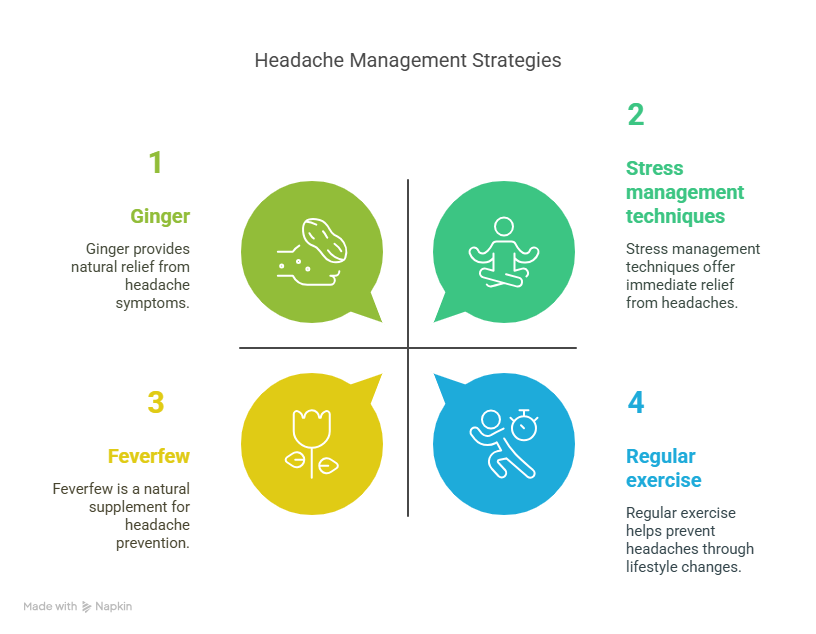Are you sick and weary of headaches interfering with your life? This crippling ailment affects millions of people globally, and choosing the best headache medicine may make all the difference.
There are many different types of headaches, and knowing which one you’re having is essential to getting relief. Your quality of life may be greatly enhanced by being aware of the finest headache pain management alternatives, regardless of whether you have a cluster headache, migraine, or tension headache.
In order to help you make wise choices about your health, this article will walk you through the many kinds of headaches and the best ways to cure them.
Recognizing Various Headache Types
Effective management of headaches requires an understanding of their many kinds. In general, headaches fall into a number of kinds, each having unique symptoms and characteristics.
The Signs and Signs of Tension Headaches
A band or squeezing feeling around the forehead is a common description of tension headaches. Usually mild to severe, they may be brought on by tension in the muscles, bad posture, or stress.
The Signs and Features of Migraine Headaches
Severe, throbbing pain is a hallmark of migraines, which are often accompanied by light and sound sensitivity, nausea, and vomiting. Medication and lifestyle modifications are often used in conjunction as migraine treatments.
Headaches in Clusters and Other Forms
Cluster headaches, which happen in cycles or clusters, are excruciatingly unpleasant. Other kinds of headaches include hormonal headaches, which are often connected to menstrual cycles, and sinus headaches, which are brought on by sinus infections.
| Type of Headache | Symptoms | Common Causes |
|---|---|---|
| Tension Headache | Mild to moderate pain, band-like sensation | Stress, poor posture |
| Migraine | Severe, throbbing pain, nausea, sensitivity to light | Hormonal changes, certain foods |
| Cluster Headache | Extremely painful, occurs in clusters | Unknown, possibly genetic and environmental factors |
Which Over-the-Counter Medication Is Best for Headaches?
Knowing the many over-the-counter (OTC) pharmaceutical alternatives is essential for anybody looking for efficient headache treatment. A variety of remedies for various headache kinds are available in over-the-counter headache medications.
NSAIDs, or nonsteroidal anti-inflammatory drugs,
Because of its anti-inflammatory qualities, NSAIDs are a popular option for headache treatment. They function by lowering the synthesis of prostaglandins, which are pain-causing chemicals that resemble hormones.
Ibuprofen (Combiflam, Brufen)
One common NSAID used to treat headaches is ibuprofen. It works well to lessen inflammation and discomfort.
Dispirin and Ecosprin aspirin
Another NSAID that is often used for its anti-inflammatory and pain-relieving qualities is aspirin.
(Paracetamol – Crocin, Dolo) Acetaminophen
A common pain treatment that works well for mild to severe headaches is acetaminophen. For those who are unable to take NSAIDs, it is often advised.
India Offers Combination Medicines
There are also combination drugs that include a variety of painkillers, such acetaminophen and NSAIDs. Some patients may benefit from these.
| Medication Type | Examples | Key Benefits |
|---|---|---|
| NSAIDs | Ibuprofen, Aspirin | Anti-inflammatory, pain relief |
| Acetaminophen | Paracetamol | Pain relief, gentle on stomach |
| Combination Medications | Mixed pain relievers | Effective for varied symptoms |
Alternative and Natural Techniques for Treating Headaches
Alternative and natural therapies provide a viable alternative to traditional medication for treating headaches. These techniques may be used with conventional therapies to provide all-encompassing headache care.
Popular Ayurvedic Treatments in India
In India, ayurvedic treatments for headaches have been practiced for millennia. The anti-inflammatory qualities of herbal supplements, such as ginger and feverfew, may help reduce headache symptoms. These all-natural solutions provide a comprehensive method of treating headaches.
Modifications to Lifestyle to Avoid Headaches
The frequency and intensity of headaches may be considerably decreased by adopting certain lifestyle modifications. Headaches may be avoided with regular exercise, stress reduction strategies, and enough sleep. People may better control their headache symptoms by adopting these routines into their everyday lives.

Dietary and Hydration Factors
In order to manage headaches, it is crucial to stay hydrated and pay attention to food triggers. The frequency of headaches may be decreased by avoiding trigger foods and drinking plenty of water. Overall health may also be enhanced by eating a diet that is well-balanced and full of fruits, vegetables, and whole grains.
| Method | Description | Benefits |
|---|---|---|
| Ayurvedic Remedies | Herbal supplements like feverfew and ginger | Anti-inflammatory properties, holistic approach |
| Lifestyle Changes | Regular exercise, stress management, adequate sleep | Reduces headache frequency and severity |
| Hydration and Diet | Drinking water, avoiding trigger foods | Reduces headache frequency, overall well-being |
Conclusion: Identifying the Best Treatment for Your Headache
Selecting the appropriate headache medicine requires knowing what kind of headache you’re having. There are many ways for treating headaches, including cluster headaches, migraines, and tension headaches.
Acetaminophen (such as Crocin or Dolo) and NSAIDs are examples of over-the-counter drugs that may provide immediate relief. On the other hand, headaches may also be effectively managed using natural and alternative approaches, such as Ayurvedic treatments and lifestyle modifications.
You may take charge of managing your headaches and enhance your quality of life by investigating various headache treatment alternatives and figuring out what suits you best. Finding the correct answer may significantly improve your everyday life, and effective headache treatment is within grasp.

